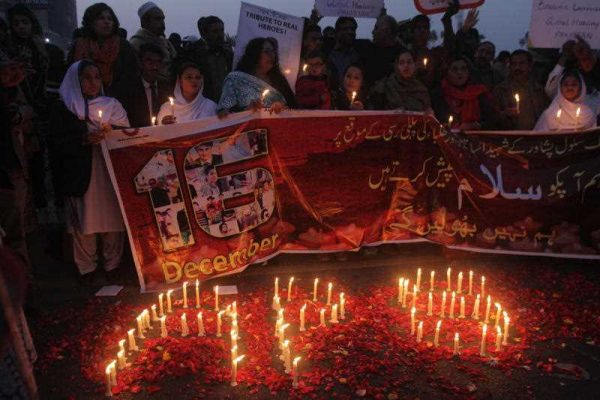The executions were possible because the government lifted a seven-year old moratorium on the death penalty in response to the security crisis.
Among the country’s security concerns are religiously inspired militants in its north-western border territories and politically patronised criminal syndicates in the south. To make matters worse, Pakistan continues to have extremely volatile relations with both Afghanistan to the west and India to the east.
Pakistan’s war on terror and criminal gangs expanded during 2015 with a discernible decline in violent incidents across the country. The attack on the Army Public School galvanised the top civilian and military leadership to create the 20-point National Action Plan (NAP) in January — virtually the first counter-terrorism roadmap in Pakistan. The NAP aimed to strengthen the National Counterterrorism Authority, renew action against communication networks between terrorist organisations and rescind the moratorium on executions.
By early December 2015, the number of executions had surged to nearly 300, most of them convicts who had been on death row for years. Both the President Mamnoon Hussain and the Army Chief General Raheel Sharif dismissed appeals for mercy at special military courts, which were established following the Peshawar attack. Building upon Operation Zarb-e-Azb, which began in June 2014, military and civilian law enforcement agencies have also continued raids against terrorist networks and criminal syndicates nestled in the mountainous northwest bordering Afghanistan.
Pakistan’s re-evaluation of its counter-terrorism measures has created an unprecedented space for critical discourse on other fundamental issues. Take for example the Supreme Court’s recent observations in blasphemy-related cases. In October, the Supreme Court upheld the death sentence awarded to Mumtaz Qadri, who killed a former governor in January 2011 for criticising Pakistan’s blasphemy laws. But, in a courageous move, the Supreme Court also supported calls to reform the blasphemy laws, which it said were often misused for personal motives. Such bold remarks were practically unthinkable until recently.
But, while Pakistan appears to be firming up some gains against religious militants, its relations with neighbouring Afghanistan remain fractured. Afghan leaders, including President Ashraf Ghani, accuse Pakistan of being unreliable in efforts against the Taliban.
Pakistan managed to host a maiden face-to-face meeting near Islamabad on 7 July 2015 between the Taliban and Afghan government representatives. Yet the news of the death of Taliban founder Mullah Mohammad Omar in late July scuttled the second round of talks. Afghans blamed Islamabad for holding back the news of Omar’s demise and practically broke off the dialogue. This was followed by a fresh string of Taliban-led violence.
Many Afghan leaders fault Islamabad for inconclusive action against militants who allegedly use Pakistani soil for planning terrorism in Afghanistan. In early December Mullah Omar’s successor, Mullah Akhtar Mansoor, was reportedly critically injured in a firing incident in or near a Pakistani border town. Afghanistan Chief Executive Officer Abdullah Abdullah subsequently argued in an official statement that ‘the incident had exposed the nature of the imposed war by terrorist groups and it proved that their organisation and centres are located out of the Afghan border’.
Afghans also disregard the Pakistan Army chief’s assertion that Operation Zarb-e-Azb targets militants of all shades. At the same time, Islamabad maintains that sanctuaries of the terrorist outfit Tehreek-i-Taliban Pakistan in Afghanistan are used to facilitate terrorist attacks in Pakistan.
An added concern for Pakistan is India’s increasing political clout and economic cooperation with Afghanistan. In the aftermath of the 11 September 2001 attacks, India has contributed over two billion dollars’ worth of infrastructure assistance to Afghanistan, including some security agreements.
A US Congressional Research Service report in October 2015 echoed Pakistan’s suspicions. The report stated that ‘India’s goals are to deny Pakistan “strategic depth” in Afghanistan, to deny Pakistan the ability to block India from trade and other connections to Central Asia and beyond, and to prevent militants in Afghanistan from attacking Indian targets in Afghanistan’.
This constitutes an additional headache for Pakistan, which saw its relations with India nosedive during 2015. Pakistan’s relationship with India came to a standstill following India’s cancellation of foreign secretary talks in August 2014. Talks between the two national security advisors were also called off. The breakdown of the latter followed differences over the prosecution of the accused perpetrators of the November 2008 Mumbai terrorist attacks and Pakistan’s insistence on communicating with Kashmiri separatist leaders in New Delhi.
As a whole, 2015 marked considerable successes for Pakistan against religious militancy, with world powers such as the United States and China rallying around its efforts. China in particular has offered Pakistan unprecedented infrastructure investments worth approximately US$46 billion over the coming years. Many see such investments as a game-changer for the economically battered country.
Some signs of a thaw with both Afghanistan and India emerged on 9 December, when leaders from both countries attended the Afghanistan-focused Heart of Asia conference in Islamabad. Yet Pakistan will most likely struggle to repair and normalise its relations with both India and Afghanistan because of multiple conflicting and competing regional interests.
Challenges flowing from these external factors are connected with its internal security problems. Until Pakistan undertakes more vigorous efforts to defeat extremist doctrines within its borders, foreign concerns about such elements will continue to strain its relations with major neighbouring countries.
Imtiaz Gul is Executive Director, Centre for Research and Security Studies, Islamabad. He is also the author of The Most Dangerous Place: Pakistan’s Lawless Frontier and Pakistan: Before and After Osama.
This article is part of an EAF special feature series on 2015 in review and the year ahead.


Good summary.
Small editing error.
Paragraph 4 – it should be December 2015 and not 2014. Now corrected, ED